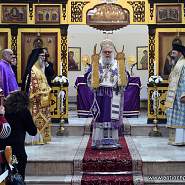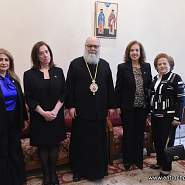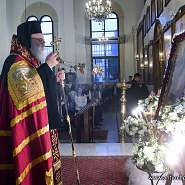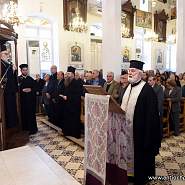Saint Paul the Confessor
Saint Paul was from Thessalonica. He became the secretary of Alexander, Patriarch of Constantinople (see Aug. 30), a deacon, and then the successor of Saint Alexander in about 337. Because of his virtue, his eloquence in teaching, and his zeal for Orthodoxy, the Arians hated and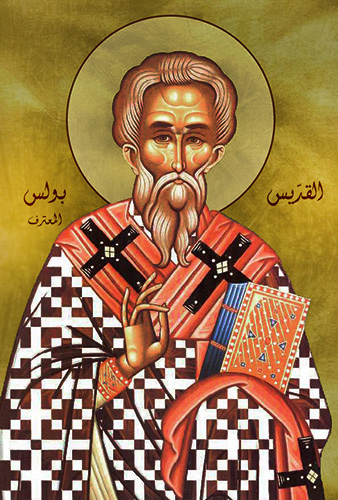 feared him. When the Arian Emperor Constantius, who was in Antioch, learned of Paul's election, he exiled Paul and proclaimed the Arian Eusebius Patriarch. Saint Paul went to Rome, where he found Saint Athanasius the Great also in exile. Provided with letters by Pope Julius, Paul returned to Constantinople, and after the death of Eusebius in 342, ascended again his rightful throne; the Arians meanwhile elected Macedonius, because he rejected the Son's con-substantiality with the Father (and the divinity of the Holy Spirit besides). When Constantius, yet at Antioch, learned of Paul's return, he sent troops to Constantinople to drive Paul out. The Saint returned to Rome, where Saint Athanasius also was again in exile. Constans, Emperor of the West, Constantius' brother, but Orthodox, wrote to Constantius that if Athanasius and Paul were not allowed to return to their sees, he would come with troops to restore them him-self. So Paul again returned to his throne. After the death of Constans, however, Constantius had Paul deposed. Because of the love of the people for Saint Paul, Philip the Prefect, who was sent for him, was compelled to arrest him secretly to avoid a sedition. Paul was banished to Cucusus, on the borders of Cilicia and Armenia; a town through which his most illustrious successor, Saint John Chrysostom would also pass on his way to Comana in his last exile. In Cucusus, about the year 350, as Saint Paul was celebrating the Divine Liturgy in the little house where he was a prisoner, the Arians strangled him with his own omophorion, so much did they fear him even in exile. His holy relics were brought back to Constantinople with honour by the Emperor Theodosius the Great.
feared him. When the Arian Emperor Constantius, who was in Antioch, learned of Paul's election, he exiled Paul and proclaimed the Arian Eusebius Patriarch. Saint Paul went to Rome, where he found Saint Athanasius the Great also in exile. Provided with letters by Pope Julius, Paul returned to Constantinople, and after the death of Eusebius in 342, ascended again his rightful throne; the Arians meanwhile elected Macedonius, because he rejected the Son's con-substantiality with the Father (and the divinity of the Holy Spirit besides). When Constantius, yet at Antioch, learned of Paul's return, he sent troops to Constantinople to drive Paul out. The Saint returned to Rome, where Saint Athanasius also was again in exile. Constans, Emperor of the West, Constantius' brother, but Orthodox, wrote to Constantius that if Athanasius and Paul were not allowed to return to their sees, he would come with troops to restore them him-self. So Paul again returned to his throne. After the death of Constans, however, Constantius had Paul deposed. Because of the love of the people for Saint Paul, Philip the Prefect, who was sent for him, was compelled to arrest him secretly to avoid a sedition. Paul was banished to Cucusus, on the borders of Cilicia and Armenia; a town through which his most illustrious successor, Saint John Chrysostom would also pass on his way to Comana in his last exile. In Cucusus, about the year 350, as Saint Paul was celebrating the Divine Liturgy in the little house where he was a prisoner, the Arians strangled him with his own omophorion, so much did they fear him even in exile. His holy relics were brought back to Constantinople with honour by the Emperor Theodosius the Great.

2024-04-18
2024-04-14
Sunday Liturgy of Saint John…
2024-04-12
His Beatitude Receives a…
2024-04-12
The Fourth Akathist Prayer in…
2024-04-11
Great Compline Prayer in Jdeidat…




